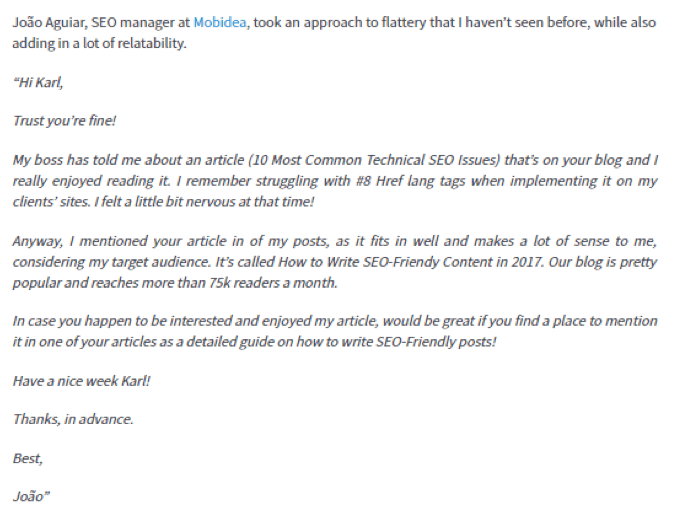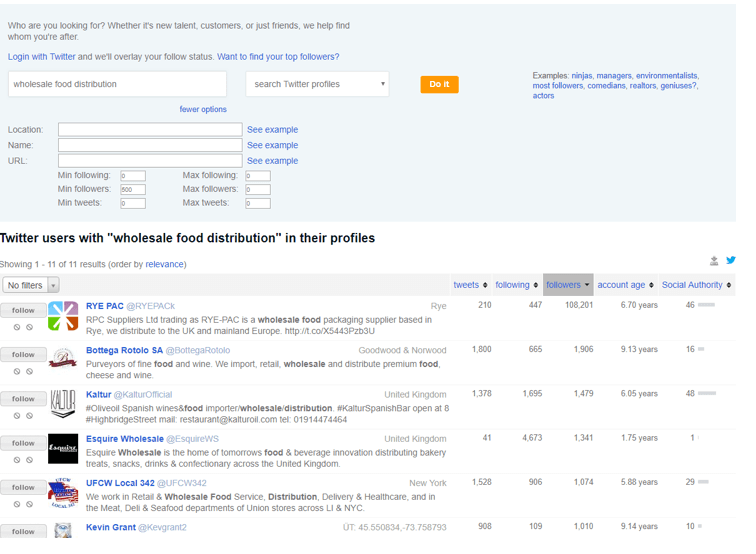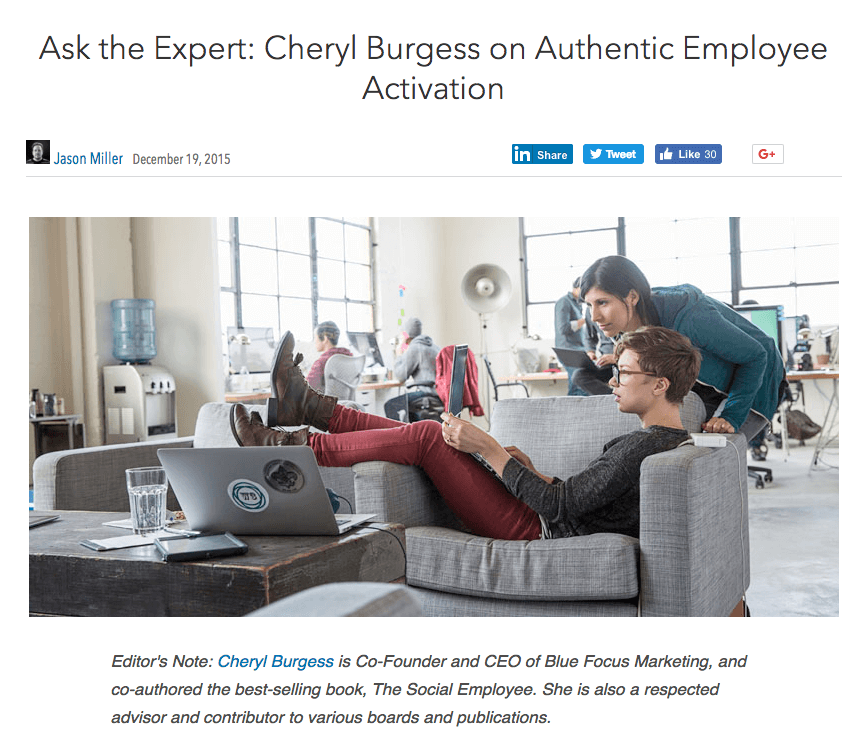A Guide to Social Influencer Marketing in B2B
Influencer marketing isn’t just for the B2C space.
It makes sense in any industry where at least one person has become notable and respected for their knowledge, contributions, and insights. In fact, it would be difficult to find a niche where influencers weren’t making their mark. By successfully using influencers, you can increase trust with your target audience, make your content more appealing, and give your audience a person they can relate to.
The latter may be the most important, because people tend to form relationships with brands not businesses. By having a respected person act as an ambassador or evangelist for your brand, you add a genuine face and personality.
The old adage is true, people buy from people.
Of course, in the B2B space, influencer marketing is a bit more challenging. In B2C, a brand can simply find a well-known person that their audience will find relatable. That person doesn’t necessarily have to have any direct relationship with the product or service offered, or any relevant professional expertise, they can simply promote it as something they consume in their personal life. In a sense, B2C ambassadors are really often pitchmen.
In B2B, it’s necessary to dig a little bit deeper to find the folks who are truly creating content that garners significant engagement, and who have earned trust and respect in your field. Their popular content, or “earned media,” is where you want to be featured. This kind of exposure has been shown to resonate with audiences more effectively, leading to a higher ROI. Earned media can yield a 6.85x ROI when compared to every dollar spent on paid media.
To learn more about using social influencer marketing in B2B, keep reading. The following guide will give you concrete action steps for getting started.
Don’t Confuse Popularity With Influence
It’s easy to identify the popular people within an industry. They attract plenty of followers on social media. They draw equal crowds at events and conferences. They are likeable and entertaining. They are often great storytellers, historians, even diplomats. But, they aren’t influencers. They are the folks that people want to sit near while attending industry events.
Influencers, on the other hand, are the ones that are doing the speaking at these events. They write articles for industry publications and maintain expert blogs that earn large followings. Influencers also tend to create and participate in relevant conversations on platforms like Twitter.
In fact, Twitter may be the ideal place to begin to identify B2B influencers. Even better, there are tools like FollowerWonk and Buzzstream that can help.
In the case of Followerwonk, users can enter keywords to search either Twitter user profiles or bios. You can also narrow things down to people with larger followings and those who contribute to the platform frequently.
Once you have this information, you can begin to identify the individuals and entities that are creating the most buzz around specific keywords.
For example, below is a search for Twitter users who have the keywords ‘wholesale food distribution’ in their profiles. This includes a distributor of fine cheeses and wine, a local union, even an individual who has an impressive social authority ranking. Social authority is the scoring system the tool uses to rank the influence Twitter users have.
Keep Your Options Open When Seeking Out Influencers
As you identify potential influencers, keep your options open.
Some will likely come to mind right away. Chances are, you already know who has positioned themselves as a respected leader in your field or in your community. Still, keep an open mind. Every target audience is different. So is every campaign. The influencer you might target for one campaign is not the same one you would use on another campaign.
Further, not every campaign has the budget to support the cost and demands of a ‘big name’ influencer. In that case, you may want to consider looking closer to home, even within your organization.
Keep in mind that an influencer is simply someone who has earned respect and has influence over your audience. Take a look at your own team. Is there someone who has managed to create a large social media presence, who speaks at events, who has a blog, or has found other ways to make their mark in your niche outside of work hours?
Sometimes, your own customers may reveal themselves as influencers! ‘Power users’ and enthusiasts often become sources of education and information to others. If your customers have written reviews of your products and/or services, this may be a good place to start looking for highly knowledgeable advocates who could become influencers.
Start by Connecting With And Helping Potential Influencers
When you pinpoint the influencer you think is the best fit for your audience, keep in mind that you probably aren’t the only brand vying for their attention. In order to build a relationship that will flourish, you have to show that you have something to offer them.
Here are a few ways to get started:
- Look for your chance to help them. Answer questions they ask, assuming you have the expertise. Pass along information and recommendations.
- Share their content. Don’t simply like and comment. Click the share button to help them increase the number of people who read and watch.
- Give them an audience by quoting them and linking their posts in your own content. If they have products or premium content, and you can do so organically, recommend them to people.
- Help them make money. Hire them for speaking, training, or consulting gigs. Recommend them to others.
- Most importantly, engage with them directly. Ask them questions. Compliment their insights. Get a feel for their personality and communication style.
Getting Influencers to Help in Your Social Campaigns
At this point, not only do you have the attention of the influencer, you have their appreciation as well. That makes the next steps infinitely easier.
Influencer engagement is challenging. There is no magic trick here. Getting an influencer to help you with a campaign is much like asking any person for a favor. The difference is that this person holds a lot of sway. The first thing you want to do is keep their communication style in mind.
Then, keeping their preferred style of communication in mind, send a direct request. Whether that should be sent over email, with a personal call, by messenger, or some other means really depends on the influencer.
The one thing that is universally true is that you should ask once, directly, without any pretext. Deborah Burroughs, head of social media at Online Writers Rating says, “If you need to, consider writing a short script. This can help if you find yourself nervous, especially if you approach the influencer in person. Keep it simple. Introduce yourself and your business, briefly explain the campaign, and then ask them in specific terms if they are willing to play a role. Show respect for the influencer’s time, and don’t leave them trying to suss out exactly what you want.”
Here’s an example, “My name is Dana. I’m with ABC Company, and we’ve been communicating on Facebook and Twitter for a few months now. My audience has shown a real interest in your thoughts. Would you be willing to participate in a Q & A session? We plan to shoot it on Facebook Live the first week of August.”
Now, this doesn’t mean that your outreach efforts have to be completely dry and without any sort of enthusiasm. Just prioritize clarity and brevity while at the same time preparing your pitch. Some common and effective techniques to gaining the attention and help of influencers include:
- Identify something you have in common with them.
- Use flattery in a subtle way.
- Name drop if you have other influencers involved.
- Add social proof to your pitch.
- Let the influencer know how you have assisted them in the past.
Below is an example of an email pitching an influencer from the article linked above:

Not only does it flatter its target, it also provides information on the ways the asker has helped the influencer expand their ‘brand’ in a sense.
Be Prepared
Let’s assume they said yes, and that you’d also like to continue a relationship with this influencer into the future. The key is to be organized, prepared, and efficient. Make sure the influencer has everything they need from you.
For example, if you want a quote to include in the forward of an ebook, send them a copy. If you want them to guest blog about something, give them a bit of information about your audience. Never put the influencer in the position of waiting for you to get it together.
Make The Most Out of It
There are many ways to leverage social influencers in B2B.
They range from the very subtle (sharing your content on their owned platforms) to the more direct (providing a video testimonial about your services). Whatever you choose, by taking the time to identify the right influencer, building a great relationship with them, asking for their help in the right way, and being organized and efficient in whatever campaign you are trying to execute.
A Few Examples
Here are a few examples of great influencer marketing in B2B.
LinkedIn’s Ask The Expert Series
LinkedIn has an ongoing series featuring influencers in a variety of industries.
Top Rank Marketing – Content Marketing World Conference
This firm brought together multiple content marketing experts to share their experiences at a live event. They then took the content from that and distributed it in the form of blog posts, slide presentations, even ebooks.
Video Fruit – Guest Blogging
When it comes to guest blogging, the goal is often to woo an influencer to write for your site. Bryan Harris, the founder of Video Fruit did the opposite. He identified an influencer (Noah Kagan), and instead offered to write a guest blog for him. As a result, he exposed his brand and product to an entirely new audience.
Then, look forward to the benefits…
There are multiple benefits to using social influencers in your digital marketing campaigns. Influencers can add a sense of trust and authority to your brand. They can help drive customers to your landing pages, and increase social media engagement.
By taking the right approach to this process, you significantly increase your chance of your efforts being a success.
Was this helpful?

